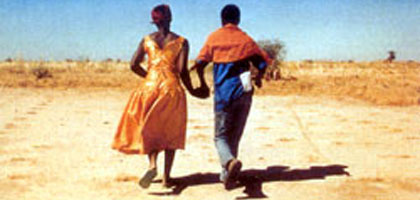
When father was away on business
Film of the Month: Abouna

Abouna is a delicate and poignant study of loss set in the Chadian bush. Philip Kemp is impressed
A man is trekking alone across the desert, silhouetted against the sky: if the genre existed, this would surely be the archetypal opening of an African Western. But the image's heroic associations - the voyager forging boldly off into the unknown - are promptly undercut as the man turns and stares into the camera, meeting our gaze and breaking the illusion of solitude. His expression is unreadable. Guilt? Regret? Relief? The opening sequence of Abouna, played under the credits, introduces a note of emotional ambivalence that recurs throughout the film.
In any case, this traveller - whom we soon learn is a father walking out on his family - isn't the focus of the action, though his absence remains palpable, colouring all that follows. He turns and trudges forward, over the crest of a dune and out of shot, never to reappear in the film except as a dream or a fantasy. His departure is simply the starting point, and from then on the focus shifts to those he's left behind. Mahamat-Saleh Haroun's first feature as writer-director Bye Bye Africa (1999) adopted the viewpoint of a Chadian expatriate like himself. (The director also took the lead role, playing a film-maker returning from Paris to his native country.) Abouna reverses that perspective. And where the earlier film suffered from uncertainty of tone, never making up its mind whether to be a feature or a documentary, this time the narrative feels more confident in its thrust, and in the immediacy of its vision.
The quiet melancholia that pervades the film draws on a sense of absence and emotional withdrawal. Most of the characters - and especially the two abandoned sons, 15-year-old Tahir (Ahidjo Mahamat Moussa) and eight-year-old Amine (Hamza Moctar Aguid) - long to be somewhere other than where they are. Early on in their search for their father they find themselves by the bridge that leads out of the Chadian capital N'Djamena across the river into neighbouring Cameroon, watching the stream of people in the faint hope their father may be among them. "Over this bridge you're already somewhere else," Tahir tells his brother wistfully. Later on, when their father sends them a poster of the sea (a potent image of otherness in a landlocked country like Chad), they pin it on the wall and gaze at it avidly. But first they usher their schoolfellows out of the room; this act of rapt contemplation is too private and personal to be shared.
In the course of the film the brothers are effectively orphaned not once but three times - first when their father leaves; then when their mother (Zara Haroun), unable to cope, banishes them to a harsh school out in the bush; and finally when Tahir, returning to the city, finds his mother has withdrawn into catatonia. We never learn exactly what caused her breakdown - the disappearance of her husband? the death of her younger son? - any more than we know just why the father left, but her diminution into this passive state comes as something of a shock (especially given her initial appearance as an imposing, capable figure on her scooter in flowing peach-coloured robes). But her reaction corresponds to that of Amine, whose first asthma attack follows his father's disappearance while his second, fatal bout seems a response to Tahir's refusal to try running away from the school again - or to explain why. Lack of emotional support can disable, or kill.
Tahir, far luckier than his brother, finds all the support he needs from an emotionally generous deaf-mute girl (we never learn her name). Mounira Khalil gives a glowingly tender performance; when Tahir lovingly decorates her ears with his first present to her, a pair of ear-rings improvised from peanut shells, her beam of joy lights up the screen.
One of the commonest tropes of sub-Saharan African cinema - as in Idrissa Ouédraogo's Samba Traoré (1992) or his fellow-Burkinan Drissa Touré's Laada (1991) - is the culture clash between city and village, with the village as the haven of wholesome, traditional values that become tarnished and forgotten amid the city's noisy streets. Haroun avoids any such schematic dichotomy: the brothers seem at ease in the city, which supports them like an extended family, while if they're lost and disaffected in the village, it's simply that they're out of their natural element. There's veiled criticism, though, of the Koranic school their mother consigns them to, where the approach to learning seems to be limited to mass, incomprehensible gabbling of the Koran (a sight familiar from Mohsen Makhmalbaf's Kandahar), and despite preaching "peace, tolerance and the removal of hatred", the teacher's only response to any kind of dissent is harsh beatings.
Another Ouédraogo movie Yaaba (1989) gets a name-check earlier on, featuring on a poster outside the movie house where Tahir and Amine believe they see their father on screen. (Laudably eclectic in its programming, the cinema also offers Chaplin's The Kid and Jim Jarmusch's Stranger Than Paradise.) At its best Abouna emulates the quiet simplicity of Ouédraogo's film. One of the most moving moments comes at the point of Amine's death. Rather than dwell on the dying boy or the grief of his brother, Haroun cuts away to a window in the wall of the darkened hut through which we glimpse a patch of light on the bare earth outside. Contemplating this almost abstract composition in total silence, the camera slowly pulls back as though gradually letting go - an image at once poignant and redemptive.
Haroun has lived and worked for much of his adult life in France, and echoes of French cinema permeate Abouna, from such classics as François Truffaut's Les Quatre Cents Coups (1959) to more recent features - a hint of Laurent Cantet's L'Emploi du temps in the revelation that the father has been going to a non-existent job for two years ("All those lies," laments Amine), and even the mirror image of Anne Fontaine's Comment j'ai tué mon père, in which the father abandons his family in France to go and work in colonial Africa. But these are no more than plot-point details, and the film never feels derivative or inauthentic. And it's hard to imagine that any European film-maker would have the audacity to end on such a note of unforced, minor-key optimism.
